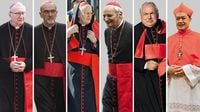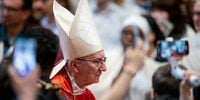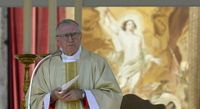On May 8, 2025, the conclave for the election of the 267th Pope reached a pivotal moment as white smoke emerged from the Sistine Chapel, signaling the election of a new pontiff. The excitement in Schiavon, the hometown of Cardinal Pietro Parolin, was palpable as residents gathered at the central bar, eagerly awaiting the announcement of the new Pope. Just moments before the white smoke appeared at 18:08, the town had been buzzing with speculation regarding the outcome of the election, particularly regarding Parolin's candidacy.
After hours of anticipation, the announcement came at 18:07: Cardinal Parolin's dream of becoming Pope was dashed as it was revealed that Cardinal Leone XIV had been elected. This decision, while surprising to many in Schiavon, was not entirely unexpected given the complexities of the voting process and the various alliances formed among the 133 cardinals participating in the conclave.
The conclave was notable not only for its size but also for its diversity, representing a wide array of ethnicities and languages. This gathering was the most crowded in history, and the first voting session had already revealed a challenging dynamic among the voters. The first ballot, which had been held the previous day, was described as a "consultation" aimed at gauging the sentiments of the cardinals, verifying alliances, and assessing potential candidates.
Among the leading candidates was Cardinal Pietro Parolin, the current Secretary of State, who reportedly had a base of 40 to 50 votes. His extensive diplomatic experience and connections were seen as significant assets in the race. However, he faced stiff competition from other prominent figures, including Cardinal Luis Antonio Tagle, the Filipino archbishop of Manila, who was gaining momentum among Asian and African cardinals.
Tagle's potential support for Parolin was a topic of discussion, as it was rumored that he would bring a coalition of votes from various regions to bolster Parolin's candidacy. Despite the early optimism for Parolin, the voting patterns shifted as the conclave progressed, and it became clear that alliances were fluid.
Another notable contender was Cardinal Pierbattista Pizzaballa, who had garnered attention for his courageous stance during the Israeli-Palestinian conflict. His offer to act as a hostage to Hamas in exchange for Israeli captives showcased his commitment to peace and diplomacy. Additionally, Cardinal Matteo Zuppi and Jean-Marc Noël Aveline were also mentioned as potential candidates, each with their unique support bases and visions for the future of the Church.
As the voting continued, the complexities of the conclave became evident. The cardinals were not only voting for a Pope but also navigating a web of alliances and rivalries. Political maneuvering played a significant role, with some candidates strategically shifting support to others who appeared more likely to achieve the necessary quorum.
The historical context of the election was not lost on observers. The last five Secretaries of State who had ascended to the papacy were noted, with Eugenio Pacelli, who served until 1958, being the most recent. Parolin's candidacy was seen as a potential return to a tradition of Italian popes, which had been interrupted since the election of the first Polish Pope, John Paul II, in 1978.
Parolin, who turned seventy in January, had spent decades in the service of the Church, beginning his journey at the age of fourteen when he entered the seminary. His academic achievements included a degree in canon law in 1986, followed by a series of appointments that culminated in his role as Secretary of State in 2013. His diplomatic skills were honed at the Pontifical Ecclesiastical Academy, where he learned the intricacies of Church diplomacy.
Despite the disappointment of not being elected, Parolin's influence on the Church remains significant. His commitment to fostering dialogue and peace, particularly in the wake of the Russian invasion of Ukraine, has positioned him as a key figure in contemporary Church politics. He has been instrumental in humanitarian efforts and has worked diligently to establish relationships with various governments, including a notable agreement with China regarding the appointment of bishops.
In Schiavon, the mood shifted from hopeful anticipation to reflective acceptance as news of the election spread. The community, proud of their local son, Cardinal Parolin, recognized the challenges he faced in a competitive and often unpredictable election process. While the dream of seeing Parolin as Pope was not realized this time, his legacy and contributions to the Church are likely to endure.
As the dust settles on this historic conclave, the focus now shifts to the new Pope, Leone XIV, and the direction he will take the Catholic Church in a rapidly changing world. The complexities of the election process serve as a reminder of the intricate balance of power, influence, and faith that defines the papal selection.






